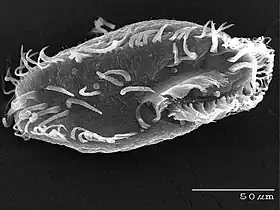Oxytrichidae
| Oxytrichidae | |
|---|---|
 | |
| Sterkiella histriomuscorum, formerly Oxytricha trifallax | |
| Scientific classification | |
| Clade: | SAR |
| Infrakingdom: | Alveolata |
| Phylum: | Ciliophora |
| Class: | Spirotrichea |
| Subclass: | Hypotrichia |
| Family: | Oxytrichidae Ehrenberg, 1830 |
| Subfamilies and genera[1] | |
| |
Oxytrichidae is a family of ciliates in the order Sporadotrichida. Oxytrichidae are morphologically diverse, ranging in length from 40 micrometres (e.g. Oxytricha setigera) to 400 micrometers (e.g. Coniculostomum monilata). They are generally elliptical in shape with some very flexible while others are rigid.[2] Like other ciliates, Oxytrichidae have two or more nuclei: a large macronucleus that generally stretches across much of the cell body, and one or more smaller micronuclei.[2]
References
- ↑ Warren, A. (2019). World Ciliophora Database. Oxytrichidae Ehrenberg, 1830. Accessed through: World Register of Marine Species at: http://www.marinespecies.org/aphia.php?p=taxdetails&id=390772 on 2019-01-07
- 1 2 Helmut Berger (1999). "General Section". Monograph of the Oxytrichidae (Ciliophora, Hypotrichia). Springer. Retrieved 30 October 2018.
| Wikimedia Commons has media related to Oxytrichidae. |
This article is issued from Offline. The text is licensed under Creative Commons - Attribution - Sharealike. Additional terms may apply for the media files.